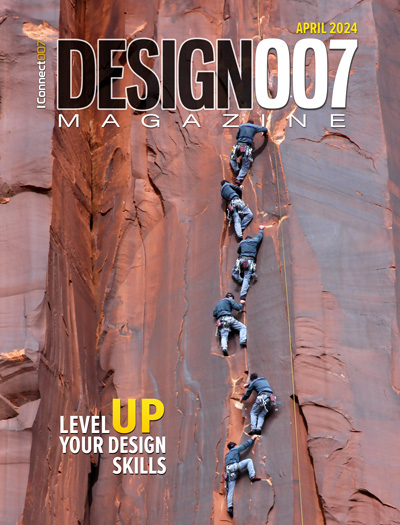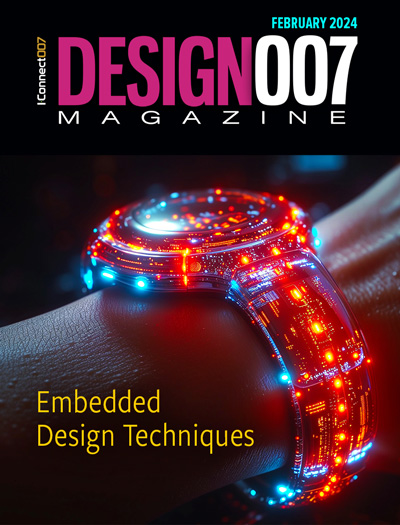-

- News
- Books
Featured Books
- design007 Magazine
Latest Issues
Current Issue
Level Up Your Design Skills
This month, our contributors discuss the PCB design classes available at IPC APEX EXPO 2024. As they explain, these courses cover everything from the basics of design through avoiding over-constraining high-speed boards, and so much more!

Opportunities and Challenges
In this issue, our expert contributors discuss the many opportunities and challenges in the PCB design community, and what can be done to grow the numbers of PCB designers—and design instructors.

Embedded Design Techniques
Our expert contributors provide the knowledge this month that designers need to be aware of to make intelligent, educated decisions about embedded design. Many design and manufacturing hurdles can trip up designers who are new to this technology.
- Articles
- Columns
Search Console
- Links
- Events
||| MENU - design007 Magazine
IPC Designers Council Viewpoint: Mike Creeden
January 20, 2016 | Andy Shaughnessy, PCBDesign007Estimated reading time: 2 minutes
When covering the IPC Designers Council, one quickly learns that it’s the volunteers who make the train run on time. San Diego PCB CEO Mike Creeden, CID+, is one such volunteer, and as a member of the Designers Council’s Executive Board, he was a must-have for this issue. I tracked him down and asked him to give us a rundown of his involvement with the DC, and to explain why designers might want to get involved with their local DC chapters.
Andy Shaughnessy: How and when did you get involved in the Designers Council?
Mike Creeden: Around 1993, I was presented by a fellow designer an invitation to attend a new meeting called the IPC Designers Council, which was being held at Qualcomm. I had known of IPC for most of my career of 17 years, but I did not know anything about a Designers Council. So, being curious by nature, I attended this meeting and immediately saw several fellow designers I was well acquainted with, and then I met several new people whom I still see to this day. There was some good food and it was an event outside of work, so I really started to enjoy the meeting.
What came next was profound. I was exposed to IPC standards and the value they brought to my designs, my company and ultimately my career! I saw that the charter of these meeting was to bring this education out to the designer in the workplace as a form of education. So being the naïve person I am, I asked, “What are we doing to get this message out there to those that don’t know about this Designers Council chapter?” The response was simple. “What do you think we should do and how would you like to go about it?” I was nominated as the Education board member and had the privilege to serve for several years.
Shaughnessy: What do you think are the most important benefits that the Designers Council offers designers and the industry?
Creeden: The Designers Council is a multifaceted organization and as such has been several different things to me over the years. I assume this must be true for other people as well. The primary benefit that the DC brings is improvements to the products in our industry. It does so by way of improving the knowledge base of each designer who attends and participates. The products we design become more reliable by applying the proven standards as determined by the experts in the industry, from a cross-section of the marketplace.
When we as designers bring improvements to our company, we’re recognized by our peers and by our employers. We may not always be rewarded, but as your value goes up, maybe it’s time to find a company that would recognize and reward your value. Another aspect that I mentioned earlier is the opportunity to network with others in your profession. This can be in the form of meeting old friends or making new friends. Maybe it is a time when you can learn some helpful methods to deal with technical issues or a professional response to something that was occurring in your workplace. Often, business connections and business deals can occur based on the contacts that you make through the Designers Council. When someone sees you attending, participating, and contributing in a public forum, they may become interested in services you offer, your expertise, and your ability to use it well.
To read this entire article, which appeared in the December 2015 issue of The PCB Design Magazine, click here.
Suggested Items
Real Time with... IPC APEX EXPO 2024: Exploring IPC's PCB Design Courses with Kris Moyer
04/18/2024 | Real Time with...IPC APEX EXPOGuest Editor Kelly Dack and IPC instructor Kris Moyer discuss IPC's PCB design training and education offerings. They delve into course topics such as design fundamentals, mil/aero, rigid-flex, RF design, and advanced design concepts. They also highlight material selection for high-speed design, thermal management, and dissipation techniques. The interview wraps up with details about how to access these courses online.
IPC Bestows Posthumous Hall of Fame Award to Industry Icon Michael Ford
04/18/2024 | IPCIPC honored the late Michael Ford, Aegis Software, for his extraordinary contributions to the global electronics manufacturing industry with the IPC Raymond E. Pritchard Hall of Fame Award at IPC APEX EXPO 2024. IPC’s most prestigious honor, the Hall of Fame Award is given to individuals who have provided exceptional service and advancement to IPC and the electronics industry. Ford, an industry leader and valued IPC volunteer, died suddenly in January 2024.
Two Industry Rising Stars Recognized at IPC APEX EXPO 2024
04/17/2024 | IPCTwo of the industry’s best and brightest were presented with an IPC Rising Star Award at IPC APEX EXPO 2024 in recognition of their leadership roles and support of IPC standards, education, advocacy, and solutions to industry challenges. Award recipients were Naim Kapadia and Michael Schleicher.
Two Long-time IPC Volunteers Receive Dieter Bergman IPC Fellowship Award
04/17/2024 | IPCThe Dieter Bergman IPC Fellowship award was presented to two IPC volunteers at IPC APEX EXPO 2024. The award recipients have fostered a collaborative spirit, made significant contributions to standards development, and have consistently demonstrated a commitment to global standardization efforts. Tiberiu Baranyi and Zhiman Chen were chosen as award recipients as they embody the work ethic and spirit of the late Dieter Bergman, an industry pioneer and icon. As part of the award, they bestowed Dieter Bergman Memorial Scholarships to the university or college of their choice.
Real Time with... IPC APEX EXPO 2024: MYCRONIC's Evolution and New Solutions
04/17/2024 | Real Time with...IPC APEX EXPOHenry Crandall interviews Kevin Clue, the vice president of global sales for MYCRONIC's High Flex division. They discuss the company's evolution, emphasizing its strong customer relationships and its role as a versatile, turnkey solution provider. Kevin unveils new solutions launched at IPC APEX EXPO, including an AI-integrated inspection system and the A40 pick-and-place platform. The conversation also touches on the increased use of AI and deep learning.


